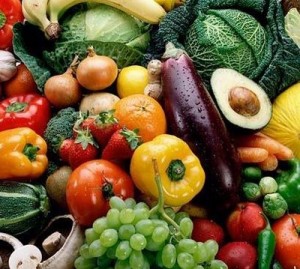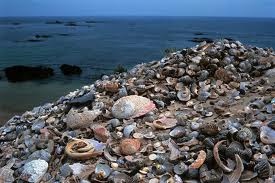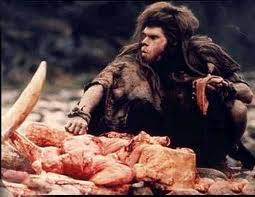 The quick answer by most would be yes, the presumption being man ate raw vegetables for a long time and is better suited to them, and them to him. But, whether you are an evolutionist or a creationist the answer might be no.
The quick answer by most would be yes, the presumption being man ate raw vegetables for a long time and is better suited to them, and them to him. But, whether you are an evolutionist or a creationist the answer might be no.
I have a lot of vegetarians and raw food advocates among my subscribers and in no way is this meant to criticize the practice. A thought simply crossed my mind the other day — or was it a thought crossed my simple mind the other day? …Any way, it was about the topic and it raised a question I thought worth exploring. That led to two interesting possibilities. Setting aside the meat/no meat debate for the moment, let’s focus on vegetables.
 We know from mesolithic fire pits, middens, bathrooms, and chemical tests what ancient man ate in general some 8,000 years ago. Or if you prefer, what he was eating after he was created by God 8,000 years ago. (That should take care of most time frames and religious sensibilities.) We also know from grave remains ancient man’s general state of health (better than ours.)
We know from mesolithic fire pits, middens, bathrooms, and chemical tests what ancient man ate in general some 8,000 years ago. Or if you prefer, what he was eating after he was created by God 8,000 years ago. (That should take care of most time frames and religious sensibilities.) We also know from grave remains ancient man’s general state of health (better than ours.)
What we know is he used fire and he ate the food with the most energy return for energy expended. Calories in, calories out. If he didn’t get more energy from the food he ate he had to call upon fat stores, and if no stores, he moved a little closer towards starvation. We also know foods he could have eaten raw, sea kale for example. It is more nutritious cooked because cooking breaks down the plant and makes the nutritional elements more accessible. From what evidence we have, he preferred cooked food over raw if he could cook it.
 Man has been using fire for at least a quarter of a million years to close to million years, cooking with it for 200,000 years. (Or if you are a creationist, he’s been using fire since he was created 8,000 years ago.) Either way cooked food is part of the warp and weave of man, either genetically over hundreds of thousands of years, or by creation’s intent. I am not sure there is a scientific or a creationist basis for eating raw vegetables, or that they are better. Consider:
Man has been using fire for at least a quarter of a million years to close to million years, cooking with it for 200,000 years. (Or if you are a creationist, he’s been using fire since he was created 8,000 years ago.) Either way cooked food is part of the warp and weave of man, either genetically over hundreds of thousands of years, or by creation’s intent. I am not sure there is a scientific or a creationist basis for eating raw vegetables, or that they are better. Consider:
 If you are a creationist raw vegan the argument is rather shaky: Man had fire from get go. He ate most of his food cooked then and now. For the creationist there isn’t much evidence man was a raw vegetable consumer. For the evolutionist it is quite easy to see how those who ate more cooked food prevailed over hundreds of thousands of years and the raw food humans didn’t. During that time humans drifted physically towards being more suited to eating cooked food. Perhaps that is why we no longer have an active appendix: We’ve cooked food for so long it has no active second-stomach function. Looking at it either way I am not sure there is an “ancient” justification to eating vegetables raw. Which leads me to the raw vegetables, my original thought.
If you are a creationist raw vegan the argument is rather shaky: Man had fire from get go. He ate most of his food cooked then and now. For the creationist there isn’t much evidence man was a raw vegetable consumer. For the evolutionist it is quite easy to see how those who ate more cooked food prevailed over hundreds of thousands of years and the raw food humans didn’t. During that time humans drifted physically towards being more suited to eating cooked food. Perhaps that is why we no longer have an active appendix: We’ve cooked food for so long it has no active second-stomach function. Looking at it either way I am not sure there is an “ancient” justification to eating vegetables raw. Which leads me to the raw vegetables, my original thought.
I receive a lot of emails from raw food advocate who want to expand their choices. Unfortunately I have some but not a lot to offer. There are a handful of wild vegetables one can eat uncooked but most of the ones we collect get cooked, particularly roots. I also noticed that nearly all raw vegetarians, or raw food advocates even if they are not vegetarians, eat almost exclusively modern foods raw. Carrots, bell peppers, cauliflower, scallions, cukes et cetera, all modern vegetables compared to what vegetables were eaten 8,000 years ago. Not only that but the usual vegetables are modified and grown under modern chemical conditions, a debatable state as well. So I ended up with:
1) An unsupported presumption that man evolved (or was designed) to eat raw vegetables, leading to 2) folks eating modern vegetable raw presuming they are good for you. It may be that man 1a) used to eat raw but evolved to be better suited to cooked food, or 1b) was designed to eat cooked foods, and 2) that modern vegetables may not be that good for you. Indeed, most of the modern vegetables are the least-offensive descendants of ancient vegetables and as such might be inherently far less nutritious. I am sure the root of a Queen Ann’s lace has far less sugar than a modern carrot, its cultivated descendant.
 Behind the raw food movement is the good idea we should not eat “processed foods.” Processed foods tend to be found in the middle of the grocery store. Real food — not processed — if found around the edges of the grocery store. I am a strong advocate of eating like our great grandparents who ate real food compared to people today. Today most folks eat mostly processed foods. I know several young couples who never cook. But more to the point: Are raw vegans eating like their great grandparents, or their ancient ancestors? I don’t think so. It might indeed be healthier to eat raw modern vegetables but I don’t think the justification will be found in the past. And while modern vegetables are not “processed” in the conventional sense, a modern hybrid bell pepper is as much a manufactured food as a box of cereal; wild apples are sour, not sweet like the domestic ones, ancient corn not sweet et cetera.
Behind the raw food movement is the good idea we should not eat “processed foods.” Processed foods tend to be found in the middle of the grocery store. Real food — not processed — if found around the edges of the grocery store. I am a strong advocate of eating like our great grandparents who ate real food compared to people today. Today most folks eat mostly processed foods. I know several young couples who never cook. But more to the point: Are raw vegans eating like their great grandparents, or their ancient ancestors? I don’t think so. It might indeed be healthier to eat raw modern vegetables but I don’t think the justification will be found in the past. And while modern vegetables are not “processed” in the conventional sense, a modern hybrid bell pepper is as much a manufactured food as a box of cereal; wild apples are sour, not sweet like the domestic ones, ancient corn not sweet et cetera.
So where does this put this forager? Looking for wild food that has less chemical contamination than the agricultural product, and more nutrition. I am sure the sow thistles I eat off my lawn are wholesome, but I most certainly would not eat any off my neighbor’s lawn, a patch of decapitated grass pretending to be a putting green. I’ll fight the ants for a persimmon or two if they’re not down hill from the interstate. “Wild” does not automatically mean “wholesome.” You need to exercise some judgment in our polluted world. Yet, despite the ravages of man, wild food is usually far more nutrition than their cultivated counterparts.
 As for foraging, it puts my diet closer to that of the hunter gathers of some 10,000 years ago, a diet that we know was successful because we are here. It is low in carbs, includes a variety of meats (lean and fatty) fish, seafood, wild fruit, roots, nuts and greens in season, grown with the help of Mother Nature not the chemist. And I tend to avoid white-colored food; rice, potatoes, pasta, white bread, just as I avoid white berries. It’s a mesolithic diet, like my 300th great grandparents ate. They’re not alive now, so I know the diet is not prefect. But, I think it’s better than what nutritionists recommend now.
As for foraging, it puts my diet closer to that of the hunter gathers of some 10,000 years ago, a diet that we know was successful because we are here. It is low in carbs, includes a variety of meats (lean and fatty) fish, seafood, wild fruit, roots, nuts and greens in season, grown with the help of Mother Nature not the chemist. And I tend to avoid white-colored food; rice, potatoes, pasta, white bread, just as I avoid white berries. It’s a mesolithic diet, like my 300th great grandparents ate. They’re not alive now, so I know the diet is not prefect. But, I think it’s better than what nutritionists recommend now.
So, are raw food advocates really eating better? It’s a point to ponder.


I tend to agree with you and that is why I like to let the vinegar and oil soak into the greens before I eat them. But I also don’t like to boil them forever like Kale in the southern states.
I have not yet purchased a juicer but will soon and let’s see if the masticating process will release all the good juices, and the pulp can mulch the garden 🙂
A nurse once told me that leaving fresh coleslaw (with dressing on it) in the refrigerator a day or two makes it easier to digest. Same principle, I guess.
Great points. I enjoyed the article much, however, I think you might want to reconsider the following:
“a modern hybrid bell pepper is as much a manufactured food as a box of cereal”
first off Deane, the box not food! please dont wake me when the cardboard eating video comes out!!!
but also, not only is the bell pepper not encased in a cardboard box, or wrapped in plastic, but its also readily obtainable by a flick of the wrist from the ground to the mouth. Cereal is a mash of millions of products produced and refined hundreds of miles from my home (compared to a homegrown hybrid pepper).
maybe you are just using some poetic license but I thought it might be helpful to reconsider.
either way thanks for the read. great work as always
I believe the intention was to just draw an exagerated parallel. The vegetables produce on a mass scale are not nearly as healthy as naturally grown vegetables/produce. They are filled with growth hormones in order to produce a larger product at a much faster rate. So essentially unless we’re growing our own or your buying from a market that naturally grows them what youre getting isn’t as great in nutritional value as it should be.
Out of curiosity, what percentage of your diet comes from foraging?
I try to eat something wild every day. One of my student’s family gets 33% of their food from the wild.
The problem with reconstructing the original, pre-fire diet that hominids evolved to eat is that we don’t know much about the conditions or the available foods in the (fairly small) environment in which they evolved.
A good guess seems to be that it was something not unlike parts of modern coastal Florida — warm, but not equatorial, with fruits and seeds available year-round, and mangrove-type ecosystems helping to supply protein, Omega 3’s, and iodine.
There’s also a lot of debate about when the regular use of fire may have started, with estimates ranging from about 1.5 MYA to as recently as 400,000 years ago.
Raw fruit, raw invertebrates incl. crustaceans and bivalves, and *certain* raw roots, greens, and seeds is a reasonable guess as to what the pre-fire diet was like. We may have specialized in a few highly nutritious and available plant species.
A speculative possibility, btw, is something like arrowhead tubers or cattail rhizomes. We can get these by wading into 3-foot-deep water in a way that quadrupeds simply can’t compete with.
Anyway, no, ‘raw vegetables’ in general is definitely not what we’re evolved to live on.
According to “People on The Move”, by Mary Hodges and Joyce Masembe, human life started on the shore of Lake Victoria. This was more of an Anthropological and Archaeological “guesstimate.”
Decades later, DNA testing said it was more towards the interior of the continent but around the same Latitude.
MY personal conclusion is we’re looking at an estuarine topography and tropical climate. We didn’t really start becoming “civilized” as we now define it till we started developing agriculture and living in cities. Some people say THAT started somewhere within the Fertile Crescent.
I like your article and it makes sense. I do take a little umbrage at your references to creationists. Don’t assume all creationists assume the world was made 8000 years ago.
An excellent point, Gray Man. And I was just getting ready to email Deane and suggest that he might be trying too hard not to offend anyone… In that regard, he obviously tries to do the impossible.
Now we need to determine the amoumt of proper cooking
Very well written (and unoffensive) article. I’ve been browsing your various articles for an hour or so now. Good stuff…
Tomatoes are loaded with antioxidants, but those antioxidants are unavailable in raw tomatoes. Only after tomatoes are cooked are those antioxidants available to us. Stewed tomatoes, spaghetti sauce, or even just ketchup is great source of antioxidants. Cooking food is a way of predigesting the food we get more out of it that way and we dont need to work as hard digesting the food, and we dont need lottsa extra guts to get the nutrition out. Only a few foods are more nutritious raw. Bears and cougars and wolves cant cook so they bury their kill and sit on it for while so it decomposes a little this is a form of predigestion. Predators eat the guts of their prey first because its a quick source of predigested food. We evolved eating cooked food, suddenly eating raw food aint gonna turn around what we have evolved to be. They only reason we got these big brains is because we started eating lottsa cooked meat a very long long time ago. Dolphins dont eat vegetables and they have bigger brains than us and are smarter than us.
Just wait until we get into a conversation about phytonutrients and anti-nutrients.
Nevermind cooking, we don’t process most foods like even our recent ancestors.
Drying destroys anti-nutrients in relevant foods, salt picking destroys others, nixtamilization destroys acidic anti-nutrients, general cooking can break down a variety of them.
Raw food vegans are fools. Not only are there nutrients that simply are not available in practical quantities in a plant only diet, there are anti-nutrients that our digestive system cannot handle by itself and there are nutrients, including specific amino acids, that you cannot make in your body, like other animals can, that you absolutely cannot get from vegetable because they do not exist in the plant kingdom e except in rate plants that are often toxic as food.
Like comfrey and lupins. Both have a complete amino acid profile but lupins need to be soaked in running water for a month to be edible and comfrey was banned for internal consumption because vegans/vegetarians wrecked their livers trying to eat comfrey as a staple food.
I’ve been vegan for 8yrs and have been very successful with it. I’m not necessarily a raw foodest. For me it’s a matter of choice and preference. Human bodies are not all wired the exact same and in my case I was born a herbivore and I like it. Some vegetables are better cooked and others raw. You always hear to make sure not to cook them too long though cause then they loose their nutritional and medicinal values. It’s always fun to eat things fresh from the garden or foraging. I’m fairly new to this fun new hobby and it’s exciting to learn just how powerfully nutritious these plants can be. Really does create a deeper bond with nature and appreciation for plants. Especially if you’ve ever felt like a weed. Misunderstood powerhouses with so much to offer the world. Beat down, uprooted and hated yet they continue to grow all on their own. Relying only on themselves and the forces of nature. Always had a loving compassion for weeds cause of that and what do you know my instincts where telling me something 😉
Nice thoughts.
Sami, I could have written just about the same letter, sounds so familiar! I agree that some of us are natural plant eaters with no desire for flesh, and I always wondered if it has something to do with our ancestry…where our culture evolved, because environments dictate food options. The healthiest and longest lived populations historically, (though not since they’ve become westernized..Asia, South America/Mexico, India, Okinawa, etc.) seem to be predominately vegetarian with minimal animal consumption and high complex starch intake. Rice, beans, corn, sweet potatoes, winter typed squash, quinoa, amaranth, and other grains and tubers made up 75% or more of their diets. The opposite end of the spectrum in health and longevity are Eskimos, the animal herding populations, and of course Americans, all who consume huge amounts of animal products, very little to no vegetables, (and now heavily processed foods including oils, flours and sugar in huge amounts!) So when I found out I had diabetes and felt horrible on the medicines, decided I had to make some major changes, did the research and went on a whole food plant based diet…nothing processed, no animal products! In 3 weeks my blood sugars were normal! I had severe arthritis and fibromyalgia, back issues, high cholesterol, high everything! I was on 13 different meds including narcotics for pain, and within 6 months I was able to cut out all of it and felt better than I had in 25 years! I also lost 150 lbs that I couldn’t budge before! T2 diabetes is a disease of too much fat in the cells, mucking up insulin regulation, high sugar levels are the result of insulin not being able to get into the cells to regulate the use of glucose, our body’s fuel. The glucose can’t get in to fuel the fatty cells either, and accumulates in the blood. High sugar is a symptom, fat is the cause. No wonder the ADA diet failed so badly, I needed to cut all sources of fat, (except for what’s found in whole food) especially what little animal food I ate, add more complex carbs and tons of plants…it made all the difference! 6 years later, still med free and feeling awesome! My husband, also diabetic opted to stay on the meds and not alter his diet, and is now missing a leg, he won’t change…so frustrating, but it is his choice, not a thing I can do. He thinks my diet is “extreme” being vegan, but apparently losing a leg, possibly the other, and now his vision, isn’t more extreme?
According to ‘Eat Right for Your Type,’ people with different bloodtypes had ancestors consuming different diets. For example, according to the author, Type O were carnivores while Type A were primarily vegetarian. Now, regardless of whether this crude distinction pencils out for everyone, I agree that different people have different dietary needs. I’ve been vegetarian for nearly 30 years (Type A). There was a learning curve to get it right, but once I did, I lost all desire to return to the meat-centered diet of my upbringing. While over time, I have relaxed my strict restrictions (I now eat slightly more seafood than before and very occasional other meats), everytime I dip into meat eating I always bounce back away from it; because i simply FEEL better when I’m not into the heavy meats and all the death and despair that accompany them. And at 52, still waiting for the first gray hair and healthier than 99% of the people around me. Not a shred of regret.
Valid points.
From what I understand cooking generally IMPROVES the ability for us to digest the food, e.g. softening of cellulose, destruction of pathogens. In the case of tomatoes, Lycopenes are released by heating. Processing in this case increases the nutritional value by enhancing the bio-availability of some (if not all) micronutrients.
Rarely is the nutritional value DIMINISHED by cooking except in the case of Vitamin C, which I understand can be destroyed by oxidation or heat.
So, apart from reducing the “crunchiness”, cooking can’t hurt the nutritional value of most foods.
Great article. Really thoughtful – thank you.
im not trying to endorse modern farming practices but you should understand something.
through evolution both plants and animals grow together, gradually cultivating each species to help itself grow and prosper. it was due to our careful selection of specific species of plants (like maze, able to produce more seeds than its native grass) we cultivated a greater variety of reliable food for consumption. the same as with animals (the original game chicken is 1/4th the size of modern breeds, a lot less foraging abilities and easily preyed upon). although i do believe that a great amount of edible diversity was left in the forest, modern sustainable permiculture is a great advancement in nutrition, and edible foods. its only the agricultural practices of the last few decades that caused our food nutritional value plummeted.
Mexico had 300 species of maize and now they have one? I have a hard time believing this is an improvement. And I don’t believe in accidents. Somehow the nature of the consciousness around agriculture has led us to this nutritional dead-end.
In Bali they have food forests. Why don’t we have these everywhere? Why is monoculture more nutritional than biodiversity? How does that make any sense?
Singing Frogs Farm is pretty much the closest I’ve seen to agriculture actually bouncing back out of the insanity. They’re still closer to trad agric than foraging on the spectrum, but there seems to be some sanity to the direction they’re heading.
I largely agree. I suspect we’re intended to eat SOME food raw, but much of it cooked. Balance!
However, the appendix does still have a purpose, as much as the medical community tries to tell it’s “extra parts.” It’s obviously not as essential as a heart or stomach, but it (and the tonsils, as well) is part of the immune system.
The appendix is probably a repository of necessary bacteria.
Eat some raw, some cooked, some fermented. Have the best of all three- it’s more omnivorous, and I wouldn’t doubt it’s what most of our ancestors did.
According to some, for 98% of human history man has little access to or ate few carbs.
i remember a study in which a snake was fed a raw mouse and another snake(the same size and age as the other one) was fed a cooked mouse. the rate of digestion was monitured. the cooked one seemed to digest faster. whather that ment more nutrition i do not know but the nutrition avalible was at least absorbed faster. i was wondering if you thought the if same would aply to vegatables, and how would i go about to doing this experiment? (what kind of animal to feed it to and what diferend aray of vegatables) or should i do the experimant on my self? (yuck)
Raw food has it’s place in a diet that is too rich, complicated and overprocessed. Very few people however, can or should make it a permanent diet. It can play a powerful role in a detoxification process, especially for the ‘overheated’ person (TCM term, which can imperfectly translate in our society to ‘unhealthily overweight’).
I highly recommend it the way that I would recommend fasting. A temporary period intended to ‘reset’ the body and taste buds rebalance blood sugar and eliminate unhealthy addictions (meat refined carbs and dairy can all be addictive in a way that leads us to eat more of them than is healthy for us).
Most Americans would benefit from it for a longer or shorter period, depending upon their personal temperment and tendencies, as they might with the lesser restrictions of going meat, carb, or dairy-free for a period of time.
After you complete this period of dietary restrictions that are appropriately matched to your needs, real food will taste better and you will feel better and this will be a permanent improvement. At that point you will realize the sacrifice wasn’t really a sacrifice, because now you are happier and enjoying life more than you were.
My personal bible is Healing With Whole Foods. For the DIYer, possibly the best book out there for self-balancing. And if the naturopath that you hire doesn’t have it on their shelf, find another naturopath. So far, I haven’t met one who doesn’t, however.
I’m so glad I found this site BTW. what a great website!